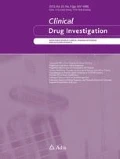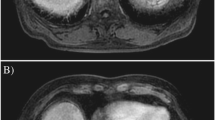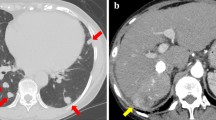Abstract
Unresectable hepatocellular carcinoma (HCC) has a poor therapeutic outcome. We report here on a 40-year-old male HCC patient who had undergone partial hepatectomy and was refractory to therapeutic embolization. In addition, the tumour expressed phosphorylated extracellular signal-regulated kinase and CD34. Sorafenib was administered as salvage treatment and resulted in a rapid decline in α-fetoprotein (AFP) levels. However, this was accompanied by a grade 3 skin reaction, which improved as sorafenib dosage was gradually reduced. Unfortunately, reducing the dose of sorafenib also resulted in a rebound in AFP levels and portal vein thrombosis was noted thereafter. Sorafenib 800 mg/day was resumed, but the tumour failed to respond. Intensity-modulated radiation therapy (IMRT) combined with sorafenib was administered, resulting in marked tumour shrinkage and causing recurrence of the systemic skin reaction and development of photosensitivity. The patient survived for 20 months after the start of sorafenib treatment. This case suggests that the combination of sorafenib and IMRT might provide clinical benefits in patients with HCC who express potential targets but fail to respond to sorafenib; however, skin reactions should be monitored.






Similar content being viewed by others
References
Parkin DM, Bray F, Ferlay J, et al. Global cancer statistics, 2002. CA Cancer J Clin 2005; 55: 74–108
Lavanchy D. Hepatitis B virus epidemiology, disease burden, treatment, and current and emerging prevention and control measures. J Viral Hepat 2004; 11: 97–107
Yamamoto J, Iwatsuki S, Kosuge T, et al. Should hepatomas be treated with hepatic resection or transplantation? Cancer 1999; 86: 1151–8
Venook AP. Treatment of hepatocellular carcinoma: too many options? J Clin Oncol 1994; 12: 1323–34
Kim TH, Kim DY, Park JW, et al. Three-dimensional conformal radiotherapy of unresectable hepatocellular carcinoma patients for whom transcatheter arterial chemoembolization was ineffective or unsuitable. Am J Clin Oncol 2006; 29: 568–75
Zhu AX. Systemic therapy of advanced hepatocellular carcinoma: how hopeful should we be? Oncologist 2006; 11: 790–800
Abou-Alfa GK, Schwartz L, Ricci S, et al. Phase II study of sorafenib in patients with advanced hepatocellular carcinoma. J Clin Oncol 2006; 24: 4293–300
J. Llovet, S. Ricci, V. Mazzaferro, et al. Sorafenib improves survival in advanced hepatocellular carcinoma (HCC): results of a phase III randomized placebo-controlled trial (SHARP trial). ASCO Annual Meeting Proceedings Part I. J Clin Oncol 2007; 25: 18S
Pugh RNH, Murray-Lyon IM, Dawson J-L, et al. Transection of the oesophagus for bleeding oesophageal varices. Br J Surg 1973; 60: 646–9
The Cancer of the Liver Italian Program (CLIP) Investigators. A new prognostic system for hepatocellular carcinoma: a retrospective study of 435 patients. Hepatology 1998; 28: 751–5
Liu L, Cao Y, Chen C, et al. Sorafenib blocks the RAF/MEK/ ERK pathway, inhibits tumor angiogenesis, and induces tumor cell apoptosis in hepatocellular carcinoma model PLC/PRF/5. Cancer Res 2006; 66: 11851–8
Gollob JA, Wilhelm S, Carter C, et al. Role of Raf kinase in cancer: therapeutic potential of targeting the Raf/MEK/ERK signal transduction pathway. Semin Oncol 2006; 33: 392–406
Plastaras JP, Kim SH, Liu YY, et al. Cell cycle-dependent and schedule-dependent antitumor effects of sorafenib combined with radiation. Cancer Res 2007; 67: 9443–54
Poon RT, Ng IO, Lau C, et al. Tumor microvessel density as a predictor of recurrence after resection of hepatocellular carcinoma: a prospective study. J Clin Oncol 2002; 20: 1775–85
Strumberg D, Clark JW, Awada A, et al. Safety, pharmaco-kinetics, and preliminary antitumor activity of sorafenib: a review of four phase I trials in patients with advanced refractory solid tumors. Oncologist 2007; 12: 426–37
Lin CS, Jen YM, Chiu SY, et al. Treatment of portal vein tumor thrombosis of hepatoma patients with either stereotactic radiotherapy or three-dimensional conformal radiotherapy. Jpn J Clin Oncol 2006; 36: 212–7
Riesterer O, Honer M, Jochum W, et al. Ionizing radiation antagonizes tumor hypoxia induced by antiangiogenic treatment. Clin Cancer Res 2006; 12: 3518–24
Jones RJ, Matsui WH, Smith BD. Cancer stem cells: are we missing the target? J Natl Cancer Inst 2004; 96: 583–5
Kasibhatla M, Steinberg P, Meyer J, et al. Radiation therapy and sorafenib: clinical data and rationale for the combination in metastatic renal cell carcinoma. Clin Genitourin Cancer 2007; 5: 291–4
Senan S, Smit EF. Design of clinical trials of radiation combined with antiangiogenic therapy. Oncologist 2007; 12: 465–77
Acknowledgements
No sources of funding were used to assist in the preparation of this report. The authors have no conflicts of interest that are directly relevant to the content of this report.
Author information
Authors and Affiliations
Corresponding author
Rights and permissions
About this article
Cite this article
Hsieh, CH., Jeng, KS., Lin, CC. et al. Combination of Sorafenib and Intensity Modulated Radiotherapy for Unresectable Hepatocellular Carcinoma. Clin. Drug Investig. 29, 65–71 (2009). https://doi.org/10.2165/0044011-200929010-00007
Published:
Issue Date:
DOI: https://doi.org/10.2165/0044011-200929010-00007




